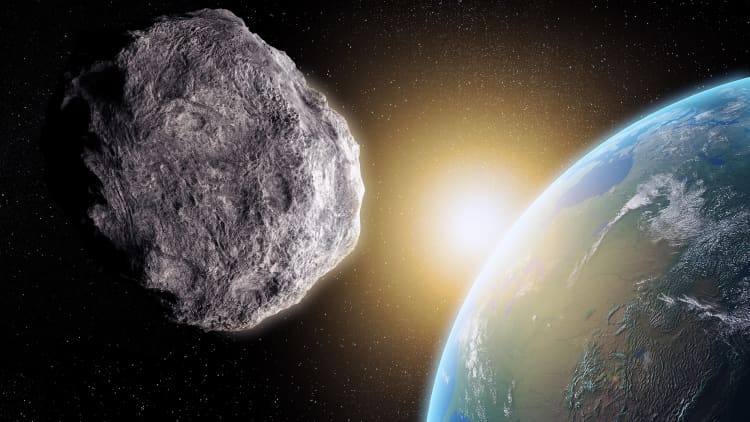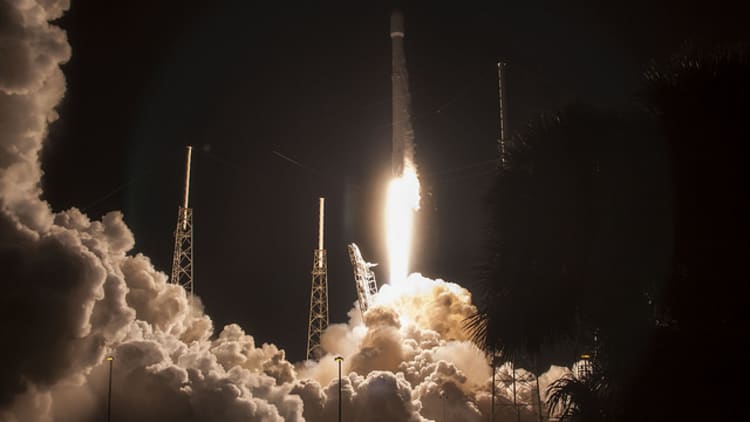
Steve Jurvetson may never walk through the frigid canyons and craters of Mars, but the venture capitalist celebrates his passion for the red planet in a different way: He collects pieces of Mars found on Earth.
At his office in Menlo Park, California, Jurvetson displays a rare treasure: the second-largest Mars rock in private hands. The textured, brownish-red rock, discovered in 1999 in the Dar al Gani desert in Libya, crystalized 180 million years ago. Today, it rests in a glass showcase in the hallway of Jurvetson's firm, Draper Fisher Jurvetson.
"It is quite moving to hold a piece of Mars in your hands," Jurvetson told CNBC, "and to reflect on its incredible interplanetary journey, and the science that gives confidence as to the origin of this unusual rock."
Jurvetson declined to say how much he paid for it, though he noted that it cost "more than my first house."

Tech power brokers often enjoy buying high-end sports cars, show horses and even private islands. Others who possess a passion for studying our vast solar system, like Jurvetson, spend their money on rocks from outer space. These ancient meteorites can be older than the Earth itself. The price tag is high: Just 100 grams of Mars rock, enough to fit in the palm of a hand, can demand $100,000.
For help tracking down such rare rocks, private collectors turn to professional meteorite hunters. These adventurers earn their living by crisscrossing the globe, searching for astronomic treasures. The risks are real, including prison and death, but so are the potential rewards — rocks that can be flipped quickly for fortunes.
The man who sold Jurvetson his Mars rock is 44-year-old Michael Farmer. Since the late 1990s, Farmer has traveled to some 80 countries looking for these precious rocks. Perhaps his best-known find is a nearly 120-pound meteorite discovered in Canada, which he and his partners sold to the Royal Ontario Museum in Toronto for $600,000.
"Any time you dig up a treasure worth more than half a million bucks, it's a good day," said Farmer, who works closely colleagues around the world tracking meteorite showers.
This work is not for the faint of heart. In 2011, Farmer was kidnapped, beaten and nearly killed by Kenyan thieves. That same year, he was charged with illegal mining in Oman and imprisoned for two months. Farmer says his motivation is not purely monetary, but rather the thrill of the chase.
"You can hold something in your hand that, just a week before, was well on the other side of the moon," he said. "That fascinates me. It's like holding a piece of history, but much older than anything we can imagine on this planet."
The rewards can be lucrative. Farmer says a meteorite paid for his house in Tucson, Arizona. Business partner Greg Hupe, 53, says he could have retired comfortably 15 years ago.
"This business has been very good to me," Hupe said. "I have no bills. I don't owe anything to anybody. That is all because of meteorites."
In November, Farmer and Hupe traveled to Bolivia, where they bought several meteorites from local Quechua people. The rocks were 4 billion years old, and found eager buyers: the two hunters sold them within 24 hours for $60,000.
Another tech entrepreneur interested in space rocks is Naveen Jain, the founder of a start-up called Moon Express that intends to land on the moon this year. Hupe sold Jain two slices of a lunar meteorite, originally discovered in Morocco. Each slice weighs roughly a pound and costs "hundreds of thousands of dollars," according to Hupe.
Meteorite hunters often donate a portion of their discoveries to university labs in exchange for assistance with authentication. Through chemical analysis, scientists can validate the specimens. Carl Agee, a professor at the University of New Mexico who specializes in meteorites, says these hunters perform a valuable task for academics.
"If there were no hunters out there, we would not be getting new meteorites to study," Agee said.
Source: Steve Jurvetson
Farmer and Hupe note that the business of making money in meteorites has changed dramatically. Years ago, they traveled to places like Morocco and Algeria and bartered personally with nomads in tents for sought-after space rocks. Today, many of these same locals use smartphones, and negotiate directly with private collectors through email or social networks like Facebook.
Farmer and Hupe now often earn their paychecks by acting as brokers between locals who discover the meteorites and collectors all over the world.
"I've become a kind of personal shopper for some collectors," Hupe said.
The hunters say that business is booming for meteorites. Supply is limited and demand is strong, not only in Silicon Valley but all over the world. Farmer says he retains a list of 20 clients who will pay $1 million and more for the right rock.
For customers like Jurvetson, the appeal of meteorites remains the ancient and unique story that each rock reveals as well as their incredible scarcity. He notes that only 0.1 percent of meteorites are from the moon or Mars, making them rarer than pure diamond on Earth.
When asked whether meteorites represent a sound investment, Jurvetson responded: "Perhaps, but I think it provides more pleasure in the story it tells and as a trigger for the imagination."


